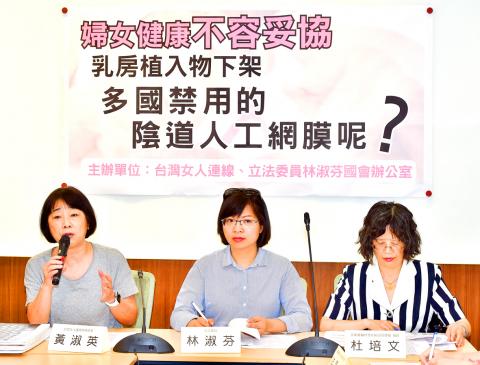Democratic Progressive Party Legislator Lin Shu-fen (林淑芬) and Women’s Link founder Huang Sue-ying (黃淑英) yesterday called on the government to ban transvaginal mesh implants and establish a registry system for medical implants.
Transvaginal mesh implants are used to repair weakened or damaged tissue in women’s bladder or pelvic areas, usually in cases of pelvic organ prolapse (POP) or stress urinary incontinence (SUI).
The US Food and Drug Administration (FDA) cleared the first surgical mesh product specifically for use in SUI cases in 1996 and for POP cases in 2002.

Photo: Tu Chien-jung, Taipei Times
However, complications including chronic pain, vaginal bleeding or discharge, pain during intercourse, urinary problems and exposure of the mesh through the vagina have been reported in many nations, triggering lawsuits in several countries.
New Zealand and Australia last year banned the use of the implants, while the UK enacted a temporary ban, and in April, the FDA ordered manufacturers to immediately stop selling and distributing surgical mesh for anterior compartment prolapse repair, citing safety concerns, Huang told a news conference at the Legislative Yuan in Taipei.
“Compared with the proactive measures taken in other nations, Taiwan is still silent on the issue,” she said.
The Ministry of Health and Welfare only changed the classification of transvaginal mesh to a third-class “high-risk” medical device in July 2017, requiring manufacturers to submit a safety report on their products every six months, Huang said.
“The government is very irresponsible. Its relaxed attitude toward regulating the manufacturers, neglecting the health risks to women who have had such implant surgery,” Lin said.
Reports of complications associated with transvaginal meshes in Taiwan increased from 59 cases in 2013 to 303 cases in 2017, and some patients might not even be aware that their discomfort could be the result of complications caused by the implants, she said.
The government needs to establish a medical implant registry system, and require that patients be informed about the possible risks associated with transvaginal meshes before having such surgeries.
Food and Drug Administration section chief Tu Pei-weng (杜培文) said the agency was aware of international safety warnings about the products and had adjusted the risk management measures on such implants.
However, a meeting of specialists that the agency held in March suggested that the reported problems in Taiwan stemming from such procedures were more due to physicians’ training and patient screening than with the products, she said.
The specialists at the meeting said that banning the use of transvaginal mesh implants would hurt women with SUI or POP, as there is no better alternative treatment, Tu said.
Given patient personal data protection regulations, registry systems are usually voluntary, not compulsory, she said.
An amendment to the Regulations for Governing the Management of Medical Devices (醫療器材管理法) that is under review at the Legislative Yuan would require the tracking of high-risk medical devices from the manufacturers, Taiwan’s Food and Drug Administration said.

Taiwanese can file complaints with the Tourism Administration to report travel agencies if their activities caused termination of a person’s citizenship, Mainland Affairs Council Minister Chiu Chui-cheng (邱垂正) said yesterday, after a podcaster highlighted a case in which a person’s citizenship was canceled for receiving a single-use Chinese passport to enter Russia. The council is aware of incidents in which people who signed up through Chinese travel agencies for tours of Russia were told they could obtain Russian visas and fast-track border clearance, Chiu told reporters on the sidelines of an event in Taipei. However, the travel agencies actually applied

Japanese footwear brand Onitsuka Tiger today issued a public apology and said it has suspended an employee amid allegations that the staff member discriminated against a Vietnamese customer at its Taipei 101 store. Posting on the social media platform Threads yesterday, a user said that an employee at the store said that “those shoes are very expensive” when her friend, who is a migrant worker from Vietnam, asked for assistance. The employee then ignored her until she asked again, to which she replied: "We don't have a size 37." The post had amassed nearly 26,000 likes and 916 comments as of this

New measures aimed at making Taiwan more attractive to foreign professionals came into effect this month, the National Development Council said yesterday. Among the changes, international students at Taiwanese universities would be able to work in Taiwan without a work permit in the two years after they graduate, explainer materials provided by the council said. In addition, foreign nationals who graduated from one of the world’s top 200 universities within the past five years can also apply for a two-year open work permit. Previously, those graduates would have needed to apply for a work permit using point-based criteria or have a Taiwanese company

The Shilin District Prosecutors’ Office yesterday indicted two Taiwanese and issued a wanted notice for Pete Liu (劉作虎), founder of Shenzhen-based smartphone manufacturer OnePlus Technology Co (萬普拉斯科技), for allegedly contravening the Act Governing Relations Between the People of the Taiwan Area and the Mainland Area (臺灣地區與大陸地區人民關係條例) by poaching 70 engineers in Taiwan. Liu allegedly traveled to Taiwan at the end of 2014 and met with a Taiwanese man surnamed Lin (林) to discuss establishing a mobile software research and development (R&D) team in Taiwan, prosecutors said. Without approval from the government, Lin, following Liu’s instructions, recruited more than 70 software